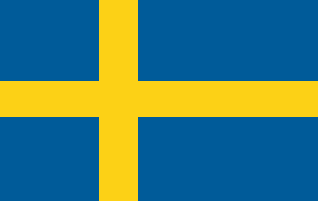
Sweden
Sweden was one of the 12 countries that initially signed the CERN Convention. Since then, Swedish scientists have been strongly committed to CERN, and have been active at all of CERN’s accelerators.
Today, Swedish researchers participate in the ATLAS and ALICE experiments at the Large Hadron Collider (LHC). Two groups from KTH (Royal Institute of Technology) and Stockholm University, both from Stockholm, have contributed to the calorimeter system at ATLAS. The group at Stockholm University has also developed electronics for the trigger. Uppsala University and Lund University have built part of the tracking system. Another group from Lund University is a member of the ALICE Collaboration and has participated in the construction of the time projection chamber.
In addition, researchers and engineers from Uppsala University are involved in accelerator development and tests for the current upgrade of LHC (HL-LHC). The work there concerns cryostats for connecting superconducting current leads, anti-cryostats for high-precision magnetic measurements and tests of superconducting magnets.
Swedish groups are also involved in the work with the future accelerators. The group at Uppsala University is working on the test facility for CLIC and all five groups are involved in projects for developing new detector technology for an upgraded LHC and for a linear collider. Uppsala University is also involved in development of the radio frequency system for AWAKE.
The ISOLDE isotope separator, initiated by Denmark, Norway and Sweden, is used to study exotic atomic nuclei. At present, two research groups one from the Chalmers University of Technology and one from Lund University are active at ISOLDE.
The experiments at CERN will generate very large amounts of data. Part of the data flow is managed by the Nordic Data Grid Facility (NDGF) Grid Tier1 center. The Lund and Uppsala groups contribute to the operation of NDGF and work with the development of the grid middleware ARC used at NDGF.
This page was last updated on 19 June, 2025
Industrial Liaison | Knowledge Transfer | Scientific Computing